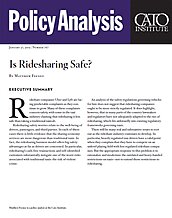Rideshare companies Uber and Lyft are facing predictable complaints as they continue to grow. Many of these complaints concern safety, with some in the taxi industry claiming that ridesharing is less safe than taking a traditional taxicab.
Ridesharing safety worries relate to the well-being of drivers, passengers, and third parties. In each of these cases there is little evidence that the sharing economy services are more dangerous than traditional taxis. In fact, the ridesharing business model offers big safety advantages as far as drivers are concerned. In particular, ridesharing’s cash-free transactions and self-identified customers substantially mitigate one of the worst risks associated with traditional taxis: the risk of violent crime.
An analysis of the safety regulations governing vehicles for hire does not suggest that ridesharing companies ought to be more strictly regulated. It does highlight, however, that in many parts of the country lawmakers and regulators have not adequately adapted to the rise of ridesharing, which fits awkwardly into existing regulatory frameworks governing taxis. There will be many real and substantive issues to sort out as the rideshare industry continues to develop. In particular, heavily regulated taxi drivers have a valid point when they complain that they have to compete on an unlevel playing field with less regulated rideshare companies. But the appropriate response to this problem is to rationalize and modernize the outdated and heavy-handed restrictions on taxis—not to extend those restrictions to ridesharing.

